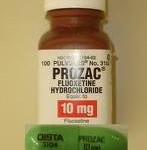50% of people don’t respond to SSRI anti-depressants
Whilst science is busy understanding why 50% of people don’t respond to the SSRI anti-depressants – fluoxetine (Prozac or Sarafem), citalopram (Celexa), paroxetine (Seroxat or Paxil) and sertraline (Zoloft),  or experience severe side-effects (see the study led by Professor Rene Han, professor of pharmacology in the Departments of Psychiatry and Neuroscience at Columbia University, published in the January 2010 issue of the Journal Neuron and also the work at Michigan by Dr John Traynor, professor of pharmacology at the U-M Medical School and director of the U-M Substance Abuse Research Center, published in Proceedings of the National Academy of Sciences) – someone may have forgotten to tell your doctor.
or experience severe side-effects (see the study led by Professor Rene Han, professor of pharmacology in the Departments of Psychiatry and Neuroscience at Columbia University, published in the January 2010 issue of the Journal Neuron and also the work at Michigan by Dr John Traynor, professor of pharmacology at the U-M Medical School and director of the U-M Substance Abuse Research Center, published in Proceedings of the National Academy of Sciences) – someone may have forgotten to tell your doctor.
And given that anti-depressants are one of the most over-prescribed drugs on the market – SSRI use increased from from 14.7 million in 2005 to 16.2 million in 2006 in the UK and 118 million prescriptions were written for antidepressants in the USA in 2005, I would think very carefully before asking my doctor for them. Doctors tend to prescribe them more when asked by their patients. The mental health charity MIND reported that 93% of GP’s have prescribed drugs due to ‘lack of alternatives.’ (In fact, there are many).
Ways to identify whom SSRI’s will work for and who will not respond are a ways off yet. So, if you’re one of the 50% who apparently do not respond to SSRI drugs, i.e. your serotonin actually gets lower rather than higher when taking them (the reverse of what is meant to happen), then, given the delicacy required in weaning oneself off these drugs and the many side-effects, it might be prudent to explore other options for mood enhancement and treatment of depression before resorting to these drugs.
 Not only does it seem that SSRI’s are only effective in 50% of patients treated with them, there is mounting evidence that they are linked to increased suicide risk in adolescents, behavior problems (aggression and poor impulse control), movement disorders and muscle twitching (indicative of neuron damage), as well as the well-known side-effects of lack of libido, dryness in the mouth, etc. Most of these effects are explained by the studies noted above.
Not only does it seem that SSRI’s are only effective in 50% of patients treated with them, there is mounting evidence that they are linked to increased suicide risk in adolescents, behavior problems (aggression and poor impulse control), movement disorders and muscle twitching (indicative of neuron damage), as well as the well-known side-effects of lack of libido, dryness in the mouth, etc. Most of these effects are explained by the studies noted above.
At a public lecture recently, Dr Daniel Amen (psychiatrist and neuroscientist , author of ‘Change Your Brain, Change Your Life‘) spoke of the pleasure he observed in his medical staff when they were able to respond effectively to patient’s mental health problems with non-toxic natural and behavioural remedies instead of the toxic, side-effect ridden psychotropic drugs. Clearly at times these are absolutely indicated and he and his team use them. But he noted the drastic over-prescribing of SSRI’s by family doctors and made the comment ‘depression is not a Prozac deficiency disease.’
And Dr Dworkin in his book “Artificial Unhappiness: The Dark Side of the New Happy Class,” says “Doctors are now medicating unhappiness. Too many people take drugs when they really need to be making changes in their lives.”
So, before resorting to these drugs, take a look at your life and seriously assess what needs to change and who you might ask to help you with those changes. Consider, for a moment, the fact that everything happening in your life is a reflection of your own energetic state. It is not happening ‘to you.’ Your experiences are showing you things that need to change, now, in your energy and your life.
This perspective underlies the work we do in Energy Solutions consultations. If you start to own your problems and look for solutions you may be pleasantly surprised at what changes you can achieve. For example, Paul Farmer, chief executive of the British mental health charity, MIND, has said ecotherapy (country walks, working on the land, etc) was a credible, clinically-valid treatment option for depression and needs to be prescribed by GP’s (family doctors). How often do you get out and go for a walk?
There are also many supplements available that can help with depression, stress and sleep problems. If you know how to accurately energy test, you will find that useful supplements for you will strengthen your 6th chakra (the energy center at the center of the forehead which determines the quality of your mood, thoughts, feelings, energy levels, sleep and relationships).
For example: Phosphatidylserine. Ashwagandha, 5HTP, B5, B6, Magnesium, Melatonin can be useful to de-stress you and improve sleep – if they are right for you. Tryptophan,* St John’s Wort* and Lithium Orotate additionally can ease depression and anxiety.
Just as with SSRI drugs not everyone will respond to supplements in the same way, so you need to either test for yourself or find someone who can accurately test things for you. Though, learning to test things for yourself can be both empowering and illuminating.
* NB: Don’t combine St John’s Wort or Tryptophan or other supplements with allopathic anti-depressants. And inform yourself on any supplement you are considering taking.
Related Articles
No Responses so far. Have Your Say?
You must be logged in to post a comment.

